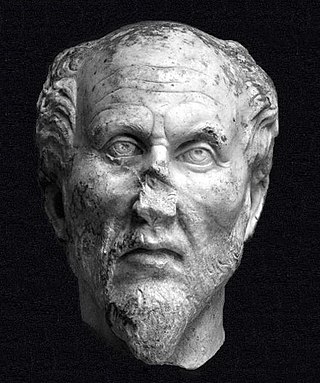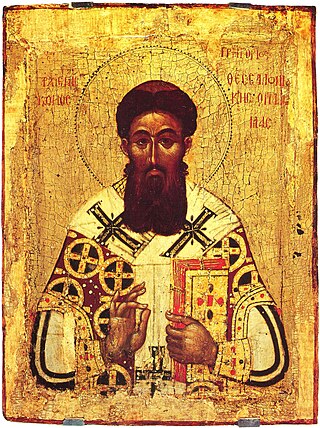In the Platonic, Neopythagorean, Middle Platonic, and Neoplatonic schools of philosophy, the demiurge is an artisan-like figure responsible for fashioning and maintaining the physical universe. The Gnostics adopted the term demiurge. Although a fashioner, the demiurge is not necessarily the same as the creator figure in the monotheistic sense, because the demiurge itself and the material from which the demiurge fashions the universe are both considered consequences of something else. Depending on the system, they may be considered either uncreated and eternal or the product of some other entity.

Gnosticism is a collection of religious ideas and systems that coalesced in the late 1st century AD among Jewish and early Christian sects. These various groups emphasized personal spiritual knowledge (gnosis) above the proto-orthodox teachings, traditions, and authority of religious institutions. Gnostic cosmogony generally presents a distinction between a supreme, hidden God and a malevolent lesser divinity who is responsible for creating the material universe. Consequently, Gnostics considered material existence flawed or evil, and held the principal element of salvation to be direct knowledge of the hidden divinity, attained via mystical or esoteric insight. Many Gnostic texts deal not in concepts of sin and repentance, but with illusion and enlightenment.

Plotinus was a Greek Platonist philosopher, born and raised in Roman Egypt. Plotinus is regarded by modern scholarship as the founder of Neoplatonism. His teacher was the self-taught philosopher Ammonius Saccas, who belonged to the Platonic tradition. Historians of the 19th century invented the term "neoplatonism" and applied it to refer to Plotinus and his philosophy, which was vastly influential during late antiquity, the Middle Ages, and the Renaissance. Much of the biographical information about Plotinus comes from Porphyry's preface to his edition of Plotinus' most notable literary work, The Enneads. In his metaphysical writings, Plotinus described three fundamental principles: the One, the Intellect, and the Soul. His works have inspired centuries of pagan, Jewish, Christian, Gnostic, and early Islamic metaphysicians and mystics, including developing precepts that influence mainstream theological concepts within religions, such as his work on duality of the One in two metaphysical states.

Apophatic theology, also known as negative theology, is a form of theological thinking and religious practice which attempts to approach God, the Divine, by negation, to speak only in terms of what may not be said about the perfect goodness that is God. It forms a pair together with cataphatic theology, which approaches God or the Divine by affirmations or positive statements about what God is.

The Nag Hammadi library is a collection of early Christian and Gnostic texts discovered near the Upper Egyptian town of Nag Hammadi in 1945.
The Sethians were one of the main currents of Gnosticism during the 2nd and 3rd century CE, along with Valentinianism and Basilideanism. According to John D. Turner, it originated in the 2nd century CE as a fusion of two distinct Hellenistic Judaic philosophies and was influenced by Christianity and Middle Platonism. However, the exact origin of Sethianism is not properly understood.
Allogenes is a series of Gnostic texts. The main character in these texts is Allogenes, which translates as 'stranger,' 'foreigner,' or 'of another race.' The first text discovered was Allogenes as the third tractate in Codex XI of the Nag Hammadi library. The Coptic manuscript is a translation of a Greek original, likely written in Alexandria before 300 AD. In this text, containing Middle Platonic or Neoplatonic elements, Allogenes receives divine revelations.
Gnosticism refers to a collection of religious groups originating in Jewish religiosity in Alexandria in the first few centuries AD. Neoplatonism is a school of Hellenistic philosophy that took shape in the 3rd century, based on the teachings of Plato and some of his early followers. While Gnosticism was influenced by Middle Platonism, neoplatonists from the third century onward rejected Gnosticism. Nevertheless, Alexander J. Mazur argues that many neoplatonic concepts and ideas are ultimately derived from Sethian Gnosticism during the third century in Lower Egypt, and that Plotinus himself may have been a Gnostic before nominally distancing himself from the movement.
John D. Turner was the Cotner Professor of Religious Studies and Charles J. Mach University Professor of Classics and History Classics & Religious Studies at the University of Nebraska. He was well known for his translations of the Nag Hammadi library.
The Manichaean Psalter is a Manichaean text written in Coptic. It is believed to have been compiled in the late 3rd century or the mid-4th century. The Psalter is believed to contain remnants of some of the earliest extant Manichaean literature.
Henosis is the classical Greek word for mystical "oneness", "union" or "unity". In Neoplatonism, henosis is unification with what is fundamental in reality: the One, the Source, or Monad. The Neoplatonic concept has precedents in the Greek mystery religions as well as parallels in Eastern philosophy. It is further developed in the Corpus Hermeticum, in Christian theology, Islamic Mysticism, soteriology and mysticism, and is an important factor in the historical development of monotheism during Late Antiquity.
John Myles Dillon is an Irish classicist and philosopher who was Regius Professor of Greek in Trinity College, Dublin between 1980 and 2006. Prior to that he taught at the University of California, Berkeley. He was elected a corresponding member of the Academy of Athens on 15 June 2010. Dillon's area of research lies in the history of Platonism from the Old Academy to the Renaissance, and also Early Christianity.
Birger A. Pearson is an American scholar and professor studying early Christianity and Gnosticism. He currently holds the positions of Professor Emeritus of Religious Studies at the University of California, Santa Barbara and Professor and Interim Director of the Religious Studies Program at the University of California, Berkeley.
Neoplatonism was a major influence on Christian theology throughout Late Antiquity and the Middle Ages in the East, and sometimes in the West as well. In the East, major Greek Fathers like Basil, Gregory of Nyssa and Gregory of Nazianzus were influenced by Platonism and Neoplatonism, but also Stoicism often leading towards asceticism and harsh treatment of the body, for example stylite asceticism. In the West, St. Augustine of Hippo was influenced by the early Neoplatonists Plotinus and Porphyry. Later on, in the East, the works of the Christian writer Pseudo-Dionysius the Areopagite, who was influenced by later Neoplatonists such as Proclus and Damascius, became a critical work on which Greek church fathers based their theology, like Maximus believing it was an original work of Dionysius the Areopagite.
April D. DeConick is the Isla Carroll and Percy E. Turner Professor of New Testament and Early Christianity at Rice University in Houston, Texas. She came to Rice University as a full professor in 2006, after receiving tenure at Illinois Wesleyan University in 2004. DeConick is the author of several books in the field of Early Christian Studies and is best known for her work on the Gospel of Thomas and ancient Gnosticism.
Neoplatonism is a version of Platonic philosophy that emerged in the 3rd century AD against the background of Hellenistic philosophy and religion. The term does not encapsulate a set of ideas as much as a series of thinkers. Among the common ideas it maintains is monism, the doctrine that all of reality can be derived from a single principle, "the One".

Johannes (Hans) van Oort is a Dutch academic who is the Professor of Patristics and Gnostic Studies at Radboud University, Nijmegen, and at the University of Pretoria, South Africa. He is best known for his specialty in the study of St. Augustine, the gnostic world religion of Mani (Manicheism), and the Gospel of Judas. In 2006 van Oort presented, with the National Geographic Society, the discovery of this gnostic “gospel” to the Dutch speaking world.
Archons in Gnosticism and religions closely related to it, are the builders of the physical universe. Among the Archontics, Ophites, Sethians and in the writings of Nag Hammadi library, the archons are rulers, each related to one of seven planets; they prevent souls from leaving the material realm. The political connotation of their name reflects rejection of the governmental system, as flawed without chance of true salvation. In Manichaeism, the archons are the rulers of a realm within the "Kingdom of Darkness", who together make up the Prince of Darkness. In The Reality of the Rulers, the physical appearance of Archons is described as hermaphroditic, with their faces being those of beasts.

Madeleine Scopello is a French historian of religion. She is director of research at the CNRS and director of studies at the École pratique des hautes études. She also teaches at the Institut catholique de Paris, Faculty of History.
In Sethian Gnosticism, Autogenes is an emanation or son of Barbelo. Autogenes is mentioned in Nag Hammadi texts such as Zostrianos, The Three Steles of Seth, Allogenes the Stranger, and Marsanes.






